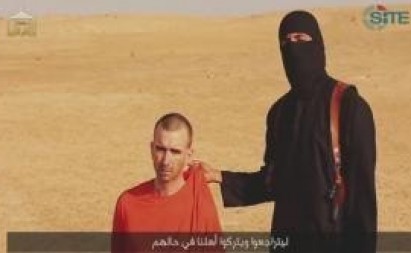(Editor’s note: Cesar Polvorosa Jr. is a business school professor of economics, world geography, and international business management in Canada. He is also a published writer in economics, business, and literature.)
During the darkest days of the Cold War, President John F. Kennedy declared to the world “Ich bin ein Berliner” (German for “I am a Berliner”).
That inspiring message before a passionate crowd in Berlin in 1963 underlined the support of the US for West Germany after the erection of the Berlin Wall prevented East Germans from escaping to the West.
That rallying cry which resonated throughout the world highlighted that the global conflict of the era was mainly on ideology: the contest for world domination between capitalism and communism.
In a watershed event of the 20th century, the Iron Curtain and the Berlin Wall fell down in 1989-90 signalling the emphatic triumph of capitalism.
Less than a quarter of a century later, the world is once more in the throes of what may be shaping up to be the next great struggle.
The confluence of harsh austerity, inequality, and prolonged economic malaise of the previous seven years, among others, has contributed to the deepening of the fissures in societies based on religion and cultures as well as fanning the erstwhile dying embers of ideological and extremist politics.
Europe is being shaken up by the advances of far left and far right parties that often have a strong anti-immigrant stance as well as skepticism about the EU itself.
These emerging new threats tend to overshadow the debates during the Great Recession of the past few years among economists and policy makers regarding the shortcomings of the present economic system and the alternative equitable and sustainable variants of mainstream capitalism.
There is a historical thread that connects the past and present conflicts though the focus has changed.
Conflict based on cultures and religions
Today, in the world of post-Communism the defense of freedom of expression and rejection of extremism galvanized into the defiant cry of “Je suis Charlie” (French for “I am Charlie”) as a message of solidarity for the slain journalists and cartoonists of the satirical French weekly magazine Charlie Hebdo as well as the other victims of terrorism.
The Paris massacre last January 7 and the subsequent bloody hostage taking of the next few days and reports of sleeper terror cells pushed Europe into the edge.
While massive rallies in the wake of the Paris killings demonstrated unprecedented support for liberty, the publication of a follow up Charlie Hebdo edition deemed offensive by Muslims triggered firestorms of protests in many countries.
The world is increasingly polarized along religious and cultural lines.
There are many troubling signs that the world is lurching toward a new era of culture- and religion-based conflict.
Just prior to the Paris attacks there were violent incidents in Canada, Australia, Nigeria, and Pakistan one after the other.
There had been the rapid and alarming rise of ISIS (Islamic State of Iraq and Syria) in 2014 and which is now estimated to control a third of Syria and Iraq that is sending shock waves throughout the globe.
Recently, Prime Minister Erdogan of Turkey warned about a possible coming of “Clash of Civilizations.”
It wasn’t supposed to be this way. There was euphoria in the West with the 1989-90 collapse of the Soviet Bloc. It was the “End of History” exulted Francis Fukuyama in referring to the triumph of Western liberal democracies. The world would supposedly stride into the 21st century as a peaceful and prosperous capitalist society.
The 1990s in fact marked the longest economic expansion in the post-World War 2 period of the US marked by the rapid adoption and commercialization of Internet technology.
In 1992, political scientist Samuel Huntington expounded the idea of the “Clash of Civilizations” or the theory that people’s cultural and religious identities will be the future nexus of conflict in the post-Cold War world.
That grim scenario recalls many of the bloody wars of history and was his response to Fukuyama’s “End of History” thesis. It wasn’t an original phrase or idea on the part of Huntington but it was his extensive and incisive analysis that caused a stir in academic circles and among policy wonks.
Marxists scoffed at the “Clash of Civilizations” thesis of Huntington as they argue that class struggle is essentially the basis of conflict in society and not culture wars. Other critics pointed out that many societies including the US and Canada are multi-cultural yet manage to develop into stable and progressive democracies.
However, came the conflagration in the Balkans and the horrors of “ethnic cleansing,” the shock of 9/11, the upheavals and convulsions in Iraq and Afghanistan, and the world was forever changed.
Fault lines in society
Every society has fault lines or possible conflicts between different interest groups in the competition for resources, political representation, and cultural recognition.
Successful management and resolution of these sources of conflicts enable a society to move forward while unresolved issues can simmer beneath the surface and often, in response to a trigger, unexpectedly strike like a destructive tremor that shakes the foundations of society.
Stable democracies are usually able to manage these conflicts as issues are properly ventilated through legitimate channels and resolved through popular vote. Thus, the possibility of Quebec independence from Canada had been a burning issue for many years but there had never been a danger of a degeneration into armed conflict as this was resolved through credible referendum as was also the recent case of Scotland.
Wars based on cultures and religion plagued humanity for the past millennium such as the Crusades, the Thirty Years’ War, and the Reconquista of the Spaniards, which extended to the colonization of the Philippines. However, why in the modern era did these rifts reappeared and widened in recent years?
(To be continued. Part 2 will be posted on Sunday, 8 February 2015.)










